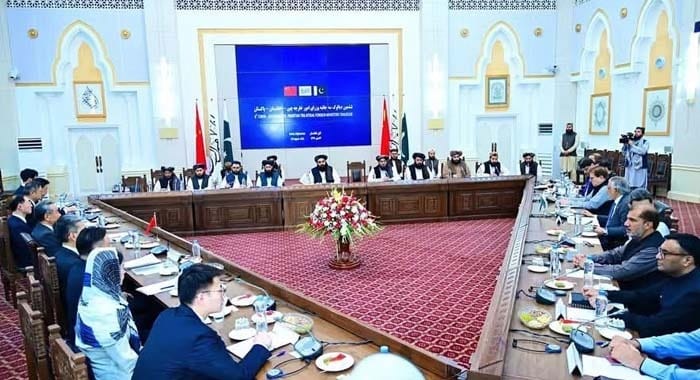In a significant diplomatic development, Pakistan, China, and Afghanistan’s Taliban government have pledged to strengthen joint efforts against militant groups operating in the region. This commitment came during high-level talks held in Kabul, where the three sides focused on enhancing security, economic cooperation, and addressing common threats.
Mohammad Sadiq, Pakistan’s special envoy for Afghanistan, confirmed that the foreign ministers of the three countries reached an agreement to collaborate on countering groups such as the Tehreek-e-Taliban Pakistan (TTP), Baloch separatists, and China’s Uyghur militant factions. Despite the Taliban’s repeated denials of harboring these groups, the trilateral meeting underscored the pressing need for collective action against such factions, all of which have alleged links to the Taliban.
“The focus of the meeting was on security cooperation, as well as fostering closer ties in trade, regional development, and addressing shared concerns related to militancy and extremism,” Sadiq stated during a press briefing following the talks. The meeting also saw a significant emphasis on improving bilateral relations and addressing security challenges that affect all three nations.
The talks took place against the backdrop of increasing violence linked to insurgent and separatist groups. Both China and Pakistan have raised concerns about the presence of militant groups operating from Afghanistan’s soil, with China particularly worried about the East Turkestan Islamic Movement (ETIM), a separatist group seeking independence for China’s Xinjiang region.
During the talks, Chinese Foreign Minister Wang Yi made a strong plea for the Taliban to take stronger action against these militant groups, underlining that security was a precondition for any future economic cooperation. “We seek to deepen trust with Afghanistan and expand cooperation in trade and agriculture,” Wang said. “But economic development cannot thrive without security.”
Also Read: Policeman Martyred in North Waziristan, Civilians Abducted in Lakki Marwat
Wang also mentioned that China planned to take practical steps within the year to kickstart the development of Afghanistan’s mining sector, a sector that holds significant promise but has been hampered by insecurity and militant activity.
Despite the Taliban’s stated commitment to crack down on terrorist organisations such as TTP, Baloch Liberation Army (BLA), and ETIM, there is a degree of scepticism surrounding the promises. Pakistan has long accused the Taliban of providing sanctuary to TTP militants, who have been responsible for a series of deadly attacks across Pakistan. A particularly contentious issue is the Taliban’s alleged collaboration with India, particularly in the wake of a deadly attack on the Jaffar Express train in Balochistan, which was claimed by Baloch separatists. Pakistan has accused the Taliban of tacitly supporting these separatists.
On the other hand, the Taliban have consistently denied that their territory is used by foreign militant groups. According to their foreign ministry, the group reiterated that Afghan soil poses no threat to any country, attempting to dispel concerns that Afghanistan remains a haven for hostile groups.
The three ministers also agreed on the importance of extending the China-Pakistan Economic Corridor (CPEC) into Afghanistan, a project hailed as a game-changer for the region’s economic integration. The Taliban have expressed their willingness to join the initiative, which could bring vital infrastructure development, including roads, power projects, and trade links between the three countries.
In addition to infrastructure, the ministers discussed the importance of counter-narcotics cooperation, with both Pakistan and China seeking more stringent measures to curb the production and trafficking of illicit drugs from Afghanistan, which remains one of the world’s largest opium producers.
While the trilateral talks between Pakistan, China, and the Taliban suggest a mutual desire for closer cooperation in the face of mounting security challenges, the true test lies in the implementation of these pledges. The presence of groups like TTP and ETIM in Afghanistan, and their potential ties with the Taliban, continues to be a critical stumbling block.
For now, the agreements made in Kabul represent a positive step towards greater regional collaboration, but they also reflect the fragile nature of peace in the region, with deep-seated tensions between the countries still lingering beneath the surface. As China and Pakistan seek to ensure their security interests are met, the Taliban’s ability to control the insurgent groups within their borders will determine the future of these diplomatic efforts.
Further developments are expected as the situation continues to unfold, with international observers closely watching the Taliban’s next steps in honouring their commitments to counter-terrorism and regional stability.





